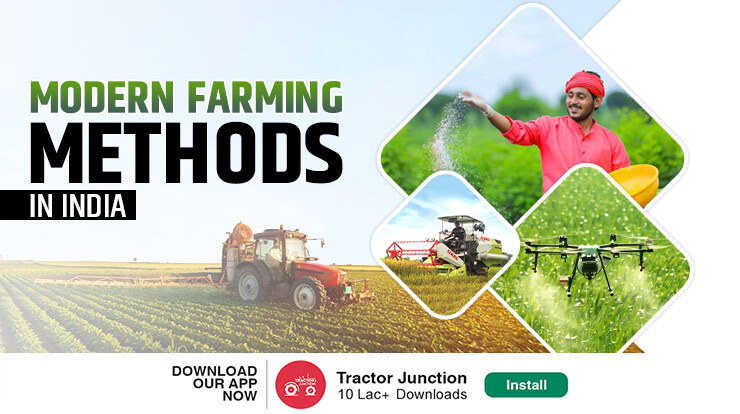
Farming is ingrained in India’s culture and heritage. Due to this fact, the country has long been renowned for its extensive and diversified farming methods. But as the population has increased, so has the need for food. As a result, farmers are beginning to plant more crops. Luckily, modern farming methods have allowed Indian farmers to take this challenge head-on.
Modern farming methods like precision farming, and sustainable methods, improve productivity. Not just that, they lower costs and ensure food security as well. The erratic weather, deteriorating soil, and water scarcity that has long plagued Indian farms are better managed by today’s farmers. In addition to providing new prospects for entrepreneurship, modern farming techniques have promoted rural development and economic expansion.
India’s modern farming practices have emerged as a leader in sustainable agriculture. With the globe still struggling to ensure adequate food supplies, Indian farming has become the need of the hour. Farmers throughout the nation are constantly adjusting to new techniques. Technology helps stay up with the shifting agricultural landscape also. In the end, modern farming methods have not only helped Indian farmers secure their livelihoods but have also contributed to feeding the expanding population, assuring a better future for everybody.
Green Revolution: The Birth of Modern Farming Methods in India
The Green Revolution was a significant development in the Indian farm industry in the 1960s. Farmers began to use improved farming methods to produce more food for the rising populace. Formerly, farmers struggled to produce enough food to feed everyone. The old farming methods just did not provide enough food.
Farmers began using new things like special crops and fertilisers. This helped them grow more food during the Green Revolution. This new farming method was a huge success and still assists farmers today. The Green Revolution assisted farmers in producing more food and ensuring that everyone had enough to eat. As a result, India is becoming one of the top food-growing countries in the world!

Technological Advancements in Modern Farming
Modern farming relies heavily on new technology. Drones are one of the new technologies being used by farmers. These are little flying machines that take aerial photographs of crops. This allows farmers to see if there are any issues with the crops. For example, they can see pest infestations or plants needing water.
Precision farming is another emerging technique. Farmers employ advanced sensors and data to assess the health of their crops. They can then use less water and fewer chemicals such as fertilisers and pesticides. This saves them money while also benefiting the environment.

Some modern technologies assist farmers with watering their crops and testing soil. These innovative technologies assist farmers in producing more food while spending less money and resources. This is significant since more and more people throughout the world require food.
Sustainable Agriculture Practices
Green Farming practices are farming strategies that serve to reduce climate change. They also ensure the long-term viability of farms. These strategies assist farmers in growing crops and raising livestock. This is done without negatively impacting the soil, water, or air.
Crop rotation is a key green farming method. This entails planting various crops yearly to help keep the soil healthy and pests and illnesses at bay.
Another significant approach is to replace chemical fertilisers with natural fertilisers. This has the potential to increase soil health. While doing so also reduces the number of contaminants that wind up in waterways.
Farmers can also adopt conservation tillage. Conservation tillage entails leaving some crop residue on the land rather than ploughing it under. This helps preserve the soil from erosion and can reduce the quantity of fuel farmers use.
Organic Farming Methods
Organic farming is a method of growing crops that does not use the usual modern farming techniques. Instead, it entails employing natural means rather than chemicals and pesticides. Farmers in organic farming work with nature to grow their crops. They feed their plants with compost and natural fertilisers and use crop rotation to keep pests at bay.
Organic farming benefits the environment by reducing the number of chemicals in farming. It also benefits people because organic food is healthier and safer to consume.
Granted, organic farming is more difficult than traditional farming. But many farmers in India are beginning to embrace organic farming practices nowadays. This is because they recognise its benefits. They are helping to safeguard the environment by choosing organic farming. In addition, they are creating food that is healthier and safer for everyone to eat.
Conclusion
Finally, modern farming faces both obstacles and potential. Climate change and rising food demand are the most pressing issues confronting farmers. On the other hand, new tech and methods are coming up to help farmers increase yield. Moreover, they’re able to do so while using fewer resources. Precision and green farming are two examples of this new tech and techniques.
There are also numerous chances for modern farming. Customers’ interest in organic and locally grown foods is growing. So, there is a market for farmers producing these types of goods. Novel crops are also gaining traction, and farmers now have more product marketing options.
To cultivate the absolute quality crops in India, make sure you buy your farming tractors and implements from the best brands.
Related Post
Why to do Rainwater Harvesting?
Top Mushroom Producing States in India
